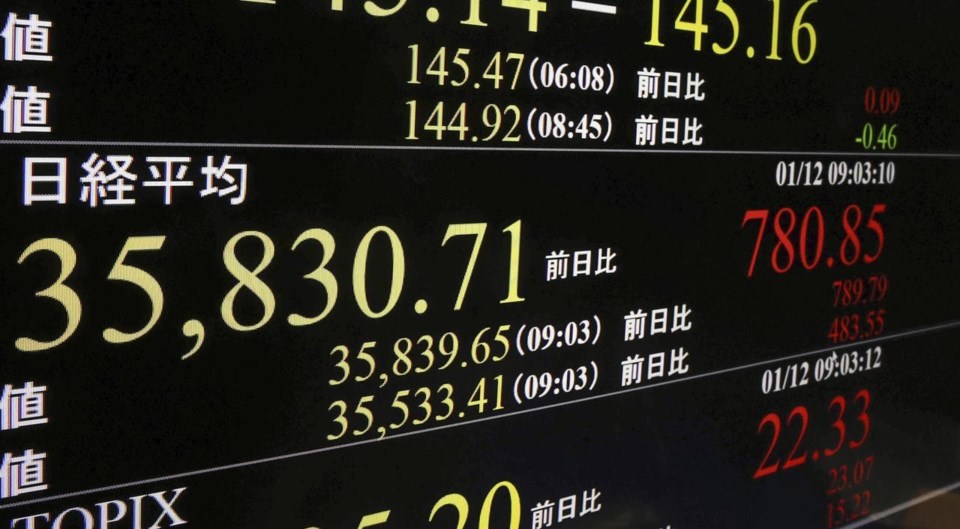BANGKOK (AP) — Asian shares turned lower Friday, though Tokyo’s benchmark extended its New Year rally, trading well above 35,000 and at its highest level since 1990.
U.S. futures slipped slightly, while oil prices surged more than $1 a barrel.
China reported its exports and imports edged higher in December in a sign that its economic recovery remains uneven, though global demand may be reviving as central banks halt their latest round of inflation-fighting interest rate increases.
Consumer prices fell 0.3% in December, the third consecutive month of declines and a sign of persisting weakness in demand. The producer price index — which measures prices that factories charge wholesalers — fell 2.7% in the 15th straight month that it has fallen.
Some of that growth was fueled by a nearly 64% increase in auto exports in 2023, to 4.1 million passenger cars, the China Association of Automobile Manufacturers reported Thursday.
On Thursday, a U.S. inflation report forced some investors to push back forecasts for when the Federal Reserve will deliver long-sought cuts to interest rates, dampening buying enthusiasm.
But Tokyo’s Nikkei 225 gained 1.5% to 35,577.11 capping a week of strong gains that have taken it to levels not seen since 1990, when Japan's asset bubbles were beginning to deflate at the outset of an era of faltering growth.
The yen's weakness against the U.S. dollar has boosted Japanese exporters like industrial robot maker Fanuc Corp., whose shares rose 2.1% on Friday.
Taiwan's Taiex declined 0.2% to 17,512.83 on the eve of presidential and legislative elections that will test the self-governed island's relations both with Beijing and with Washington.
The Hang Seng in Hong Kong shed early gains to fall 0.5% to 16,212.11 and the Shanghai Composite index slipped 0.2% to 2,881.98.
The Kospi in South Korea slipped 0.1% to 2,537.17, while Australia's S&P/ASX 200 also edged 0.1% lower, to 7,501.40.
Shares rose in Taiwan on the eve of a presidential election. Markets in India and Thailand also were higher.
On Thursday, Wall Street wobbled after the update on inflation raised questions about when the Federal Reserve could begin the cuts to interest rates that investors crave so much.
The S&P 500 slipped 0.1% to 4,780.24. The Dow Jones Industrial Average rose less than 0.1%, to 37,711.02, and the Nasdaq composite edged up by less than 0.1% to 14,970.19.
Citigroup lost 1.8% after it detailed a list of charges it will take against its fourth-quarter results, related to everything from Argentina’s troubled economy to a previously disclosed special assessment by the Federal Deposit Insurance Corp.
Hertz Global Holdings sank 4.3% after it said it expects to record a drop in the fourth quarter for an underlying measure of profits, and it’s selling about 20,000 electric vehicles to cut its EV fleet by a third.
Stocks had been roaring toward record heights on expectations that a cooldown in inflation would convince the Federal Reserve to cut interest rates sharply in 2024, which would boost prices for investments. Thursday morning’s inflation report showed U.S. consumers paid prices that were 3.4% higher overall in December than a year earlier. That’s an acceleration from November’s 3.1% inflation rate and a touch warmer than economists expected.
But trends underneath the surface may have been a bit more encouraging. After stripping out food and fuel prices, which can shift sharply from month to month, the rise in prices from November into December was close to economists’ expectations.
The inflation data sent Treasury yields on a jagged run in the bond market. After sinking from Wednesday night into Thursday, they jumped immediately after the report's release but then began yo-yoing. By late afternoon, they were lower, helping stock indexes to recover much of their earlier losses.
The yield on the 10-year Treasury was steady at 3.98% early Friday. It's down from more than 5% in October.
Early Friday, a barrel of benchmark U.S. crude was up $1.50 at $73.52, a 2.1% jump. It rose 65 cents to $72.02 on Thursday. Brent crude, the international standard, gained $1.60 to $79.01 per barrel.
In currency dealings, the U.S. dollar was at 145.24 Japanese yen, down from 145.28. The euro slipped to $1.0966 from $1.0971.
Elaine Kurtenbach, The Associated Press

